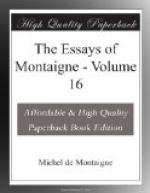Now, who would not enter into distrust of sciences, and doubt whether he can reap from them any solid fruit for the service of life, considering the use we put them to?
“Nihil sanantibus litteris.”
["Letters which cure nothing.”—Seneca, Ep., 59.]
Who has got understanding by his logic? Where are all her fair promises?
“Nec ad melius vivendum, nec ad commodius disserendum.”
["It
neither makes a man live better nor talk better.”
—Cicero,
De Fin., i. 19.]
Is there more noise or confusion in the scolding of herring-wives than in the public disputes of men of this profession? I had rather my son should learn in a tap-house to speak, than in the schools to prate. Take a master of arts, and confer with him: why does he not make us sensible of this artificial excellence? and why does he not captivate women and ignoramuses, as we are, with admiration at the steadiness of his reasons and the beauty of his order? why does he not sway and persuade us to what he will? why does a man, who has so much advantage in matter and treatment, mix railing, indiscretion, and fury in his disputations? Strip him of his gown, his hood, and his Latin, let him not batter our ears with Aristotle, pure and simple, you will take him for one of us, or worse. Whilst they torment us with this complication and confusion of words, it fares with them, methinks, as with jugglers; their dexterity imposes upon our senses, but does not at all work upon our belief this legerdemain excepted, they perform nothing that is not very ordinary and mean: for being the more learned, they are none the less fools.




